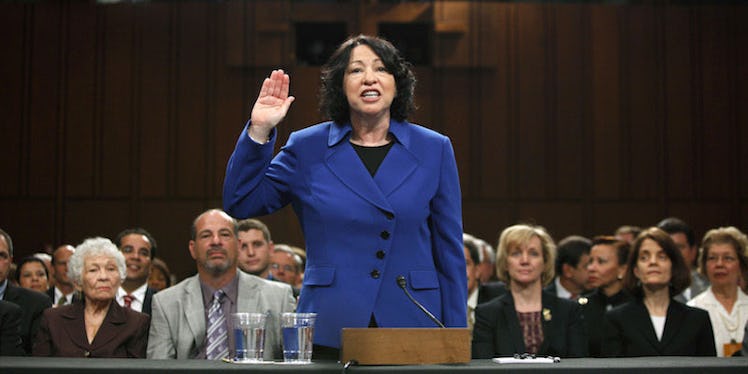
Justice Sonia Sotomayor Just Slammed Her Colleagues In An Epic Dissent
Supreme Court Justice Sonia Sotomayor stood up for people's rights against the police in a passionate dissenting opinion.
The Supreme Court released their decision on Utah v. Strieff on Monday morning. The case was about police work.
A police officer stopped a man, Edward Strieff, leaving a house because he thought he might be involved in drug activity. The police officer then found that Strieff had an outstanding arrest warrant and found drugs.
The stop was unlawful since there was no reasonable evidence that the man was committing a crime. But, the Supreme Court ruled on Monday the evidence the police officer found can still be used against Strieff.
This opinion was written by Justice Clarence Thomas. Justices Sotomayor and Elena Kagan dissented (i.e., disagreed), with Ruth Bader Ginsburg agreeing with them.
Sotomayor wrote her dissent in four parts. First, she points out that the police stopping Strieff was unlawful. Second, she says that even though the officer found illegal conduct, "two wrongs don't make a right." She wrote:
For example, if an officer breaks into a home and finds a forged check lying around, that check may not be used to prosecute the homeowner for bank fraud.
She says that courts should not accept illegally obtained evidence because it encourages police officers to follow unlawful conduct.
Then Sotomayor goes on to say that behavior like this officer's is actually systemic, despite what the other side of the Supreme Court argued.
She brings in statistics from the Ferguson, Missouri, New Orleans and Newark, New Jersey police departments to show that arrest warrants like Strieff's are insanely common. Police officers then commonly stop people just to see if they have an arrest warrant. This, she says, shows that this is not an "isolated" case and it has an effect on many people around the country whose lives could be massively affected by police stops.
The fourth part of dissent is where Sotomayor really goes in. She says that allowing police officers to stop civilians without reasonable suspicion of crime makes it easy to treat "members of our communities as second-class citizens."
Sotomayor writes:
The white defendant in this case shows that anyone's dignity can be violated in this manner ... But it is no secret that people of color are disproportionate victims of this type of scrutiny ... For generations, black and brown parents have given their children "the talk" — instructing them never to run down the street; always keep your hands where they can be seen; do not even think of talking back to a stranger — all out of fear of how an officer with a gun will react to them.
She talks about how people of color have to prepare their children for the possibility of being discriminated against by police officers.
Sotomayor cites several major black writers; this includes W.E.B. Du Bois, James Baldwin, Ta-Nehisi Coates and Michelle Alexander.
That citation tho pic.twitter.com/4FJ4UysXsK — Dylan Matthews (@dylanmatt) June 20, 2016
She then uses the phrase "double consciousness," which was created by Du Bois. Basically, it says that black people see themselves through their own eyes as well as through racist eyes of other people.
Sotomayor writes:
By legitimizing the conduct that produces this double consciousness, this case tells everyone, white and black, guilty and innocent, that an officer can verify your legal status at any time. It says that your body is subject to invasion while courts excuse the violation of your rights. It implies that you are not a citizen of a democracy but the subject of a carceral state, just waiting to be cataloged.
Sotomayor's dissent follows the arguments of the "Black Lives Matter" movement. She says that all people's rights against the police must be recognized to make sure that everybody is treated equally and with dignity.
If the Supreme Court lets illegal police conduct stand, Sotomayor says, people's freedoms are at risk. And, she clearly says, this affects people of color and their right to life and liberty more so than white people.
Sotomayor's last paragraph aligns with quotes from the movement. She says people who are routinely targeted by the police enough that their lives are changed "warn us that no one can breathe in this atmosphere."
It's easy to make a connection from that to the life of Eric Garner. Garner was routinely targeted by the police for minor crimes until the day officer Daniel Pantaleo held him in a chokehold that killed him. These were his last words:
I can't breathe.
Sotomayor ends her dissent by saying:
They are the ones who recognize that unlawful police stops corrode all our civil liberties and threaten all our lives. Until their voices matter too, our justice system will continue to be anything but.
Again, it's easy to jump from this dissent, calling for "voices" to "matter," to the "Black Lives Matter" movement. Sotomayor did not back away from the racial implications of this case and police conduct more generally.
Sotomayor said that courts have to stand for proper, lawful police conduct for any of us to have real dignity and freedom.
Citations: Supreme Court, Bloomberg, Medium